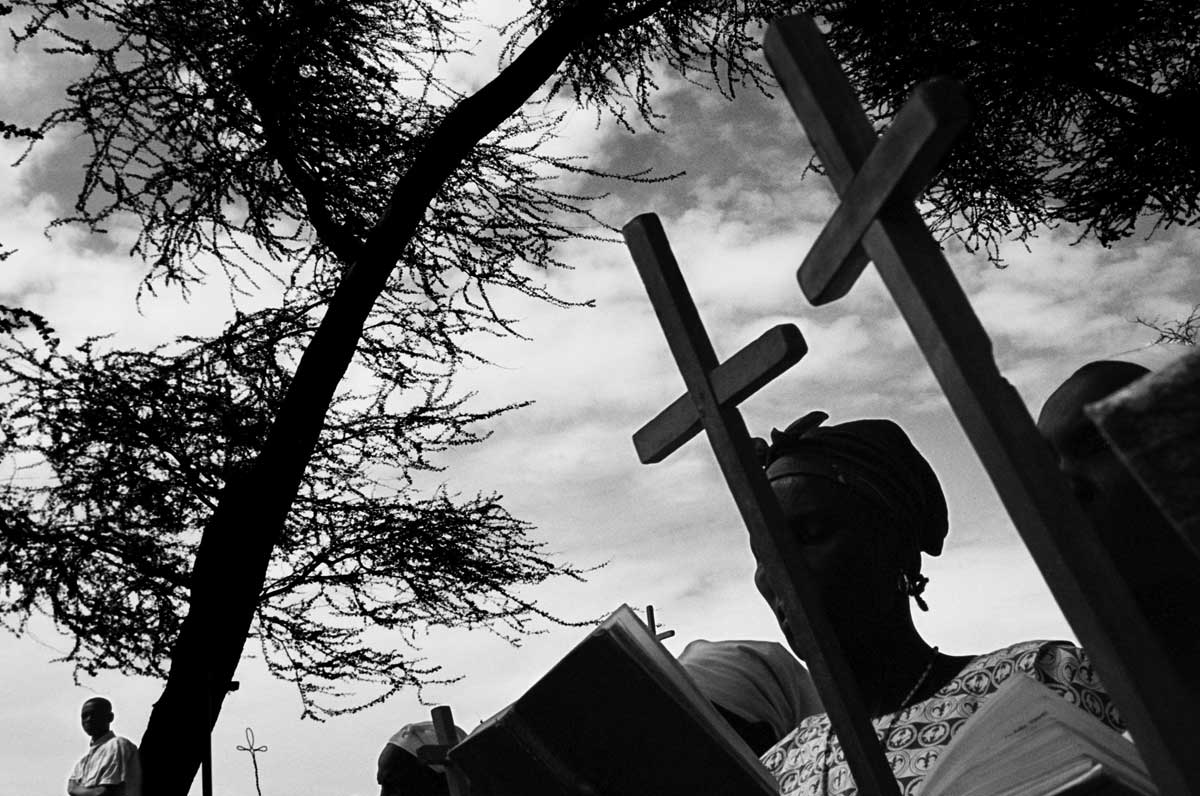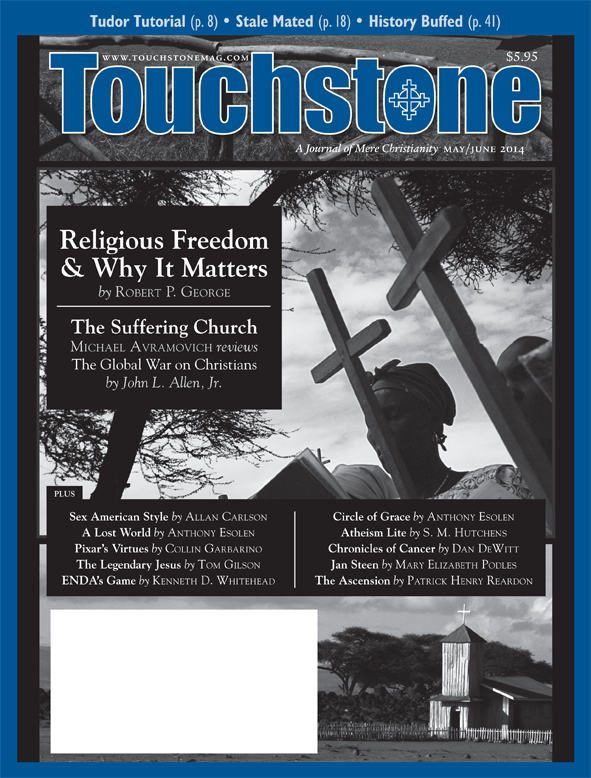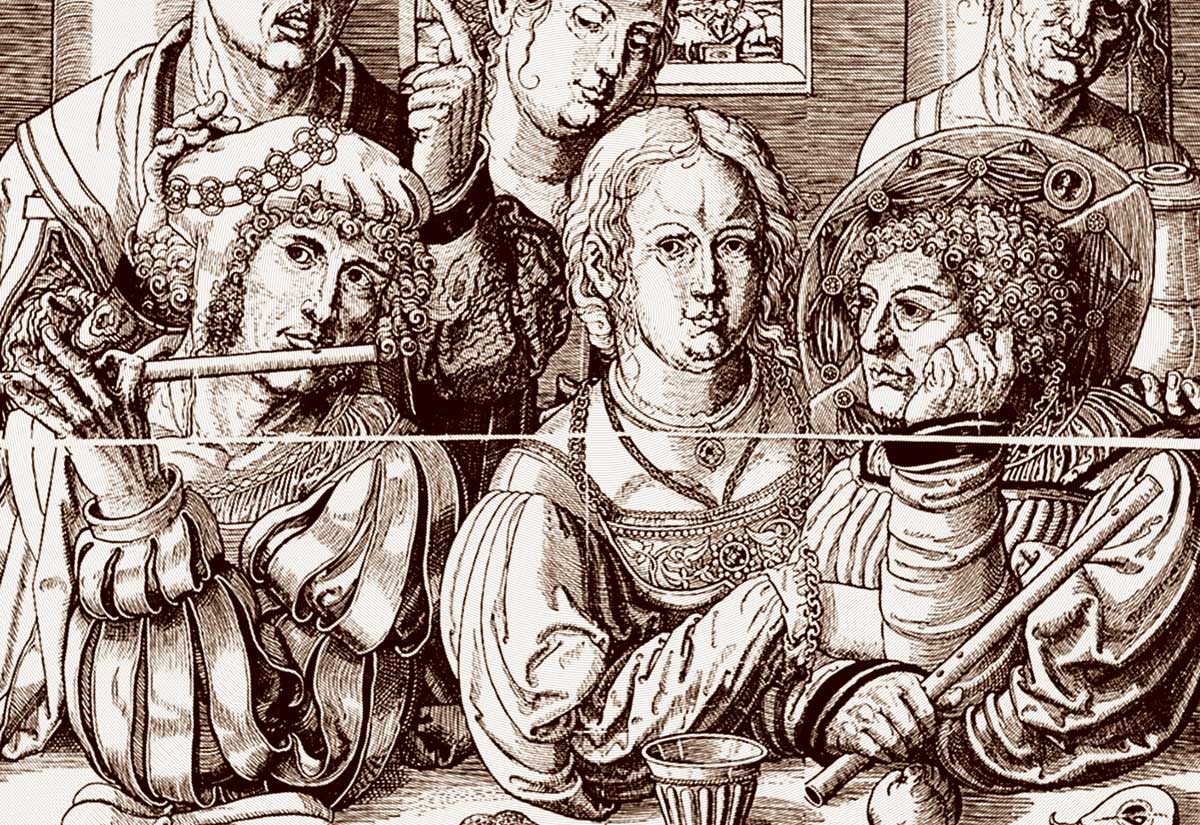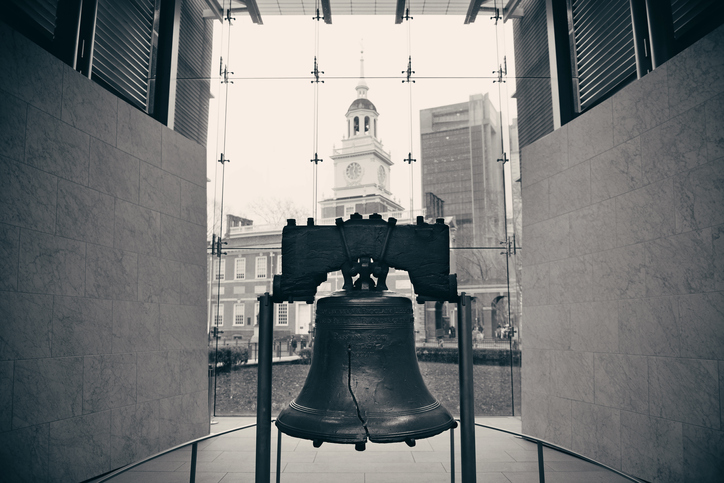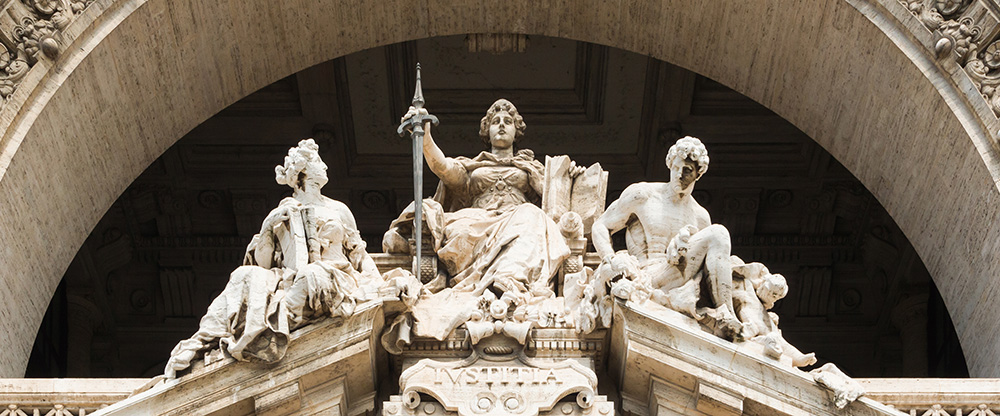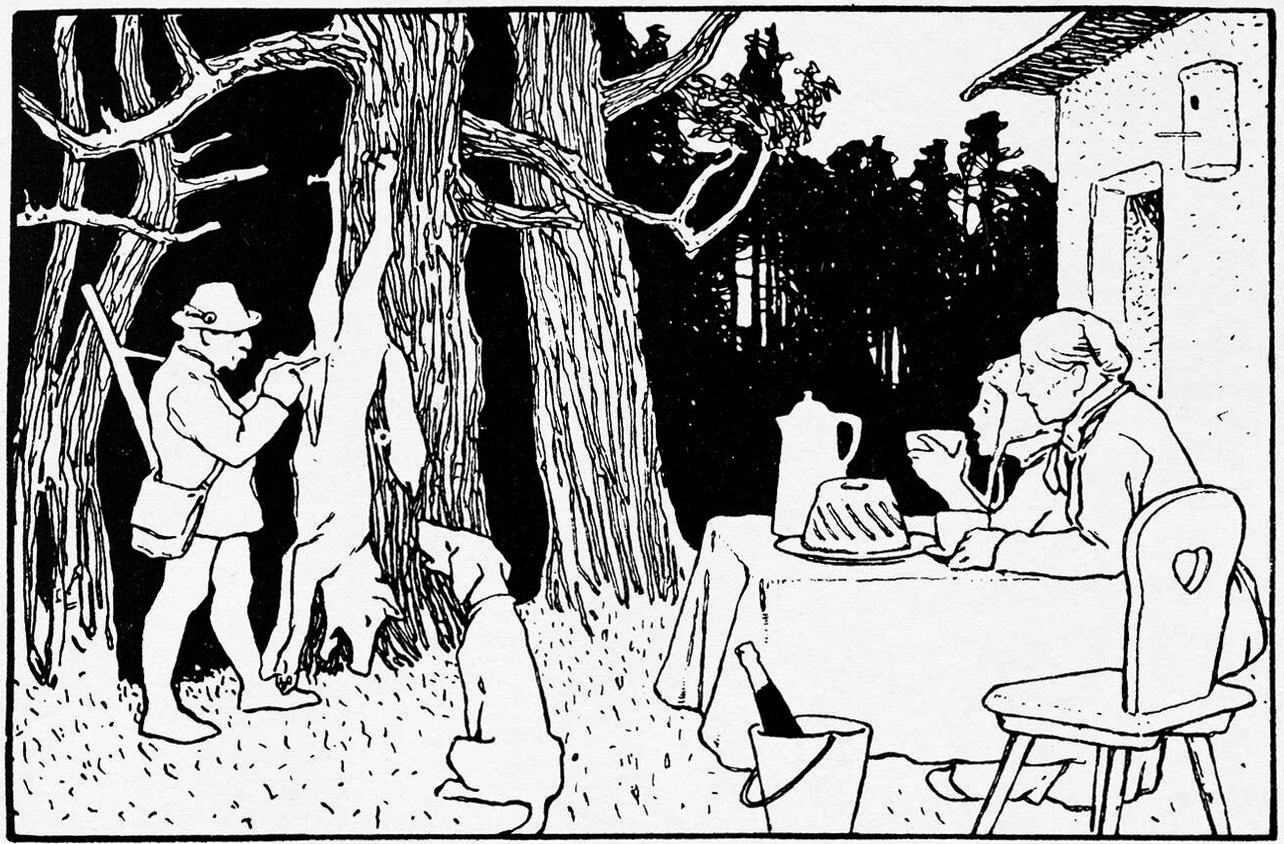Religious Freedom & Why It Matters
Working in the Spirit of John Leland
by Robert P. George
Introduction: The John Leland Award
If Touchstone had a Mount Rushmore, there are several faces we would immediately want to etch on it—C. S. Lewis, Saints Athanasius and Augustine, maybe John Paul II or G. K. Chesterton or Billy Graham. But somewhere in the planning phase, I'd bring up a name most mere Christians in America don't know, but should.
That name is John Leland.
Leland (1754–1841) was a fiery Virginia Baptist preacher. He and his generation of Baptists are almost single-handedly responsible for the constitutional guarantees that allow us to publish a magazine—freely—when we're so out of step with the spirit of the age.
Leland was an irritant and a pest. He wouldn't leave sinners alone in their sin, and he wouldn't trust the politicians when they said there would be no problem "accommodating" religious practices in the newly founded American republic. He didn't want the politicians' promises; he wanted a guarantee, written down in the Constitution itself. His generation of politicians, mind you, included Mount Rushmore-caliber statesmen, and Leland was willing to work with all sorts of allies to secure this guarantee of religious liberty.
Leland was for religious liberty because he believed no bureaucrat could stand in for a person's soul at the Judgment Seat of Christ. Religious liberty wasn't, in his mind, a government grant from Uncle Caesar but a natural right grounded in the image of God and the gospel of Christ.
In 2013, when I was elected president of the Ethics and Religious Liberty Commission (ERLC), one of the first decisions I had to make was to determine the winner of an award named for Leland. There was one obvious choice: Princeton University's Robert P. George.
Like Leland, Professor George is committed to religious liberty for all. He has been a leading voice against the U.S. Department of Health and Human Service's (HHS) obnoxious mandate requiring nearly all employers, including religious institutions, to provide free health insurance coverage for abortifacients, contraceptives, and sterilization in violation of their deeply held religious convictions. He has served as a stalwart spokesman for the preservation of marriage as the union of one man and one woman. As chair of the U.S. Commission on International Religious Freedom, he has exposed oppression against religious belief and practice.
Like Leland, George is an architect of alliances. He is the catalyst behind too many organizations to mention. And he has modeled the sort of Paul-Timothy dynamic that raises up and empowers a new generation of young leaders, of various faith traditions, all mentored by him.
And, like Leland, he's an irritant. The opponents of religious liberty aren't able to shut him up with slogans. He ploughs through their arguments with fiery rationality. He doesn't settle for "trust us" from politicians or bureaucrats (or, for that matter, from cardinals and archbishops).
Here follows the speech Robert George gave at the United States Capitol upon receiving the ERLC Leland Award. You'll see here why I treasure his character, his mind, and his courage. And you'll see why he makes presidents and legislators around the world tremble. He reminds them that the state is a good institution, but the state is not a god. State power is limited by a greater power, who will hold all lesser powers accountable.
And, in so doing, he reminds the politicians that on their best days they might aspire to Mount Rushmore, but they'll never belong on Mount Olympus.
—Russell D. Moore
On the tombstone of John Leland the following words are inscribed: "Here lies the body of John Leland, of Cheshire, who labored 67 years to promote piety and vindicate the civil and religious rights of all men." It would be naive to suppose that tombstones never lie, but this tombstone speaks the truth, for the Baptist pastor whose grave it marks truly did labor to promote Christian piety and, not unrelatedly, to protect the civil and religious rights of all men—the rights of Jews and Muslims no less than those of Christians, and even the rights of unbelievers.
Leland's concern for what we would today call human rights extended to the right of freedom generally. Leland was a fierce critic of slavery. Today, we may flatter ourselves that we, too, would have loudly opposed slavery had we lived prior to its abolition, but the truth is that very few of us would have done any such thing. But John Leland did it. He was an abolitionist when abolitionism wasn't popular.
He also played an instrumental role in guaranteeing that religious freedom would be enshrined in our Constitution through its inclusion in the First Amendment. His way of achieving that goal was wonderfully audacious: the good pastor informed his friend James Madison that he was prepared to run against him for public office unless Madison included a religious freedom provision in an amendment to the Constitution. Although I'm not sure I would commend this particular approach to every pastor in dealing with our elected officials today, I would certainly endorse John Leland's godly boldness as something every one of us can emulate, especially in service of a cause as great and foundational as the right of freedom of religion or
belief.
Religious Freedom & Our Humanity
The way some people see it, the reason for respecting religious freedom is purely instrumental and self-interested. If you and I disagree in matters of faith, I should tolerate your beliefs and practices so that you will tolerate mine. Religious freedom, on this view, is not so much a right as it is a kind of mutual nonaggression pact.
It's not difficult to see the attraction of this view or to explain why some people hold it. A world in which each community lives in fear that another group will seize power and oppress it is hardly an ideal state of affairs for any of them—except, of course, a group that is sure it will land—and stay—on top. All the others fear what will happen to their own groups, so the answer they push for is clear: let us each tolerate the other groups so that ours, too, will be tolerated.
But there's a problem with this view. The problem is not that it's in any way inaccurate or untrue, but that it doesn't go far enough. This view ignores the fact that religious freedom, at its core, means something far deeper and more profound than communities grudgingly tolerating each other in a kind of modus vivendi. It means the right to be who we truly are as human beings.
As human beings, we are drawn to ponder life's deepest questions and to seek meaningful, truthful answers. Where do we come from? What is our destiny? Is there a transcendent source of meaning and value? Is there a higher law that pulls us above personal interest to where we seek to "do unto others as we would have them do unto us"?
No matter how these questions are answered, one thing is indisputable: human beings can't stop asking them, and would be diminished precisely as human beings if they tried to do so. And that suggests that the religious quest is a constitutive part of our humanity—an aspect of our flourishing as the kind of creatures we are—namely, rational, intelligent, and free actors. This, in turn, suggests that we must cherish and honor, preserve and protect, the right of persons to ask and answer these questions as best they can, and, within the broadest limits, to lead lives in line with their best judgments of conscience.
So religious freedom means that, both as individuals and in community, we have the right to ponder life's origins, meaning, and purpose; to explore the deepest questions about human nature, dignity, and destiny; to decide what is to be believed and not to be believed; and, within the limits of justice for all, to comply with what we conscientiously judge to be our religious obligations, and to do so openly, peacefully, and without fear.
John Henry Newman once observed that "conscience has rights because it has duties." We honor the rights of conscience in matters of faith because people must be free to fulfill what they believe to be their solemn duties. Authenticity and integrity are directly threatened whenever there is coercion in matters of faith. Indeed, coercion does not produce genuine conviction, but only pretense and lack of authenticity. Compulsion may cause a person to manifest the outward signs of belief or unbelief, but it cannot produce the interior acts of intellect and will that constitute genuine faith.
It is therefore essential that freedom of religion include the right to hold any belief or none at all; to change one's beliefs and religious affiliation; to bear witness to one's beliefs in public as well as private, corporately as well as individually; and to act on one's religiously inspired convictions about justice and the common good in carrying out the duties of citizenship. And it is vital that religious liberty's full protections be extended to those whose answers to life's deepest questions reject belief in the transcendent.
The Dire Condition of Religious Freedom
Because religious freedom is so central to human personhood, we would expect that in places where it is dishonored, societies would be less happy and secure. According to a growing number of studies, that is precisely the case. These studies show that countries that protect religious liberty are more secure and stable than those that do not, and nations that trample on this freedom provide fertile ground for war and poverty, terror and radical movements. In other words, religious freedom abuses not only violate the core of our humanity, but also do grave harm to the well-being of societies.
They do so politically, as religious freedom abuses are highly correlated with the absence of democracy and the presence of other human rights abuses. They do so economically, as religious persecution destabilizes communities and marginalizes the persecuted, causing their talents and abilities to go unrealized, robbing a nation of added productivity, and reducing that nation's ability to fight poverty and create abundance for its citizens. They do so morally, since wherever religious freedom is dishonored, the benefit of religion in molding character is diminished, and with it, the self-discipline necessary to handle the rights and responsibilities of citizenship. And finally, they do so socially, since wherever religious freedom is restricted, peace and security become ever more elusive.
All of this has a direct bearing on the security of us in the United States. For example, each of the four countries that hosted Osama bin Laden during his notorious life—Saudi Arabia, Afghanistan, Sudan, and Pakistan—is an incubator of violent religious extremism, and each has perpetrated or tolerated repeated religious freedom violations. As we know, the 9/11 attacks on our country were plotted in Afghanistan, which was run by the Taliban, which itself originated in Pakistan; and fifteen of the nineteen attackers came from Saudi Arabia.
In December 2012, the Institute for Economics and Peace, an Australian think tank, released a ranking of nations based on the number of terrorist attacks launched in each between 2002 and 2011. Seven of the highest ranking countries—Iraq, Pakistan, Afghanistan, India, Somalia, Nigeria, and Russia—are also considered serious violators of religious liberty by the U.S. Commission on International Religious Freedom, which I chair.
Clearly, religious freedom matters greatly. And sadly, according to a recent Pew study, 75 percent of the world's people—more than five billion human beings—live in countries whose governments significantly restrict this fundamental right. Restrictions range from the imposition of burdensome rules on the construction of religious buildings to detention and imprisonment, torture and murder.
In Burma, despite political reforms, sectarian violence and severe abuses against ethnic minority Christians and Muslims continue with impunity.
In China, conditions continue to deteriorate, particularly for Tibetan Buddhists and Uighur Muslims. To stem the growth of independent Catholic and Protestant groups, the government has arrested leaders and shut down churches. Members of Falun Gong and other groups deemed "evil cults" face long jail terms, forced renunciations of faith, and torture in detention.
In Egypt, the government has repeatedly failed to protect religious minorities, including Coptic Christians, from violence, while prosecuting and jailing people for "defamation" of Islam.
In Iran, the government detains, tortures, and even kills members of religious minorities, including Baha'is and Christians, whose beliefs are viewed as a threat to the theocratic state and its draconian interpretation of Shi'a Islam. Christian Pastor Sayeed Abedini remains in prison, in deteriorating health; and Iran continues using terrorism to export its extremism.
In Nigeria, the terrorist group Boko Haram attacks Christians as well as fellow Muslims who do not share their radical and violent interpretation of Islam. Nigeria's government has failed to prosecute perpetrators of religious violence that has killed more than 14,000 Nigerians, both Christian and Muslim, fostering a climate of impunity for terrorists.
Saudi Arabia continues its absolute ban on all public expressions of any religion other than its own extreme interpretation of Sunni Islam. The country also exports its ideology to other nations, fueling religious freedom abuses elsewhere, including violence.
In Pakistan, incidents of chronic sectarian violence targeting Shi'a Muslims and Christians have risen dramatically. The government's continued failure to protect Christians, Ahmadis, and Hindus, along with its repressive blasphemy law and anti-Ahmadi laws, have fueled religious freedom abuses and vigilante violence.
In Russia, conditions are worsening, as the government uses extremism laws to justify raids, detentions, and imprisonment of members of certain Muslim groups and so-called non-traditional religious communities, particularly Jehovah's Witnesses.
Massive violations of religious freedom and other human rights continue in Chechnya. Similar repression occurs across Central Asia. And in Indonesia, extremist violence, coupled with government arrests of individuals considered religiously deviant, threatens its tradition of tolerance and pluralism.
Violations in the West
Religious freedom violations are even occurring in Western Europe. France and Belgium bar government workers and students in state schools from wearing "conspicuous" religious symbols, such as the Muslim headscarf, the Sikh turban, large crosses, and the Jewish yarmulke. France also forbids people to wear any headgear in official identity document photos.
Sweden, Switzerland, Norway, and Iceland have banned kosher and halal slaughter. In 2011, the Dutch parliament's lower house also passed such a ban, but an outcry from Muslim and Jewish groups forced the government to forge a compromise allowing religious animal slaughter to continue. After a similar outcry in Germany last year against a lower-court ruling criminalizing religious circumcision of male infants, the German parliament is considering a law permitting this practice.
In Germany and Sweden, government authorities have told Christian and Jewish parents that they cannot homeschool their children for religious reasons. And government officials in the United Kingdom are forcing Catholic adoption agencies to shut down because they follow the moral criteria of their faith in placing orphaned children in homes that provide a mother and father, and not in same-sex headed households.
Patterns of Violation
All of these abuses violate not just American standards of religious freedom, but international human rights standards and covenants as well. Article 18 of the 1948 Universal Declaration of Human Rights states:
Everyone has the right to freedom of thought, conscience, and religion; this right includes freedom to change his religion or belief, and freedom, either alone or in community with others and in public or private, to manifest his religion or belief in teaching, practice, worship and observance.
Since 1966, the governments of 167 countries have signed the International Covenant on Civil and Political Rights, a binding treaty with protections similar to those in Article 18. Nations around the world also affirmed the 1981 Declaration on Religious Intolerance; and regional bodies such as the Organization for Security and Co-operation in Europe, the Council of Europe, and the Organization of American States also confirm religious freedom as a fundamental liberty.
As an independent, bipartisan, federal government advisory body, the U.S. Commission on International Religious Freedom (USCIRF) is firmly committed to the human rights standards found in these documents. As a key part of its mandate, USCIRF monitors religious freedom worldwide and makes policy recommendations to the President, the Secretary of State, and Congress.
USCIRF has observed a number of patterns to religious persecution by various governments. These include:
• State hostility, which is active government persecution of people or groups on account of their beliefs.
• State sponsorship, which is the active promotion, and sometimes exportation, of ideas and propaganda—often of a violent, extremist nature—that express hostility to the religious freedom of others.
• State enforcement, which is the application of laws and statutes that curb religious freedom, and sometimes violate freedom of expression as well, such as anti-blasphemy codes that apply to members of religious minorities.
• State failure to take action to protect those whom others are targeting due to their beliefs, creating a climate of impunity for those who threaten, intimidate, attack, and even kill religious minorities or dissenters.
In every one of these categories, Christians are among the persecuted. We have also noted the stubborn persistence of anti-Semitism worldwide, including in the nations of Western Europe, where it again appears to be on the rise.
When it comes to state hostility, one of the worst persecutors is Iran's theocratic regime. The Iranian government has executed people for "waging war against God," while relentlessly targeting reformers among the Shi'a Muslim majority, as well as religious minorities, including Sunni and Sufi Muslims, Baha'is, and Christians. The Iranian regime has also stirred up anti-Semitism and promoted Holocaust denial.
Regarding state sponsorship, Saudi Arabia is a major offender. It continues to export its own extremist interpretation of Sunni Islam through textbooks and other literature that teach hatred and even violence toward other religious groups.
With respect to state enforcement, Egypt and Pakistan both enforce anti-blasphemy or anti-defamation codes, with religious minorities bearing the brunt of their harshness. Egypt and Pakistan also exemplify state failure to protect their citizens against religious violence. Ironically, both nations' enforcement of blasphemy codes fuels some of the worst violence, by encouraging vigilantes to target perceived transgressors.
In Egypt, since the fall of Hosni Mubarak, the government has tolerated widespread abuses against religious minorities, including Coptic and other Christians, Baha'is, Shi'a Muslims, and dissident Sunni Muslims. It has failed to make serious efforts to bring the perpetrators of violence to justice or to respond to virulent anti-Semitism in state-controlled media.
In Pakistan, the government's longtime failure to protect religious freedom was on brutal display in 2011 with the assassinations of Salmaan Taseer, a Muslim who was Governor of Punjab province, and Shahbaz Bhatti, a Christian who was Pakistan's Minister for Minority Affairs and a valiant religious freedom advocate. Both officials were murdered for opposing Pakistan's blasphemy law, which is used as a weapon of repression. Last year (2013) was one of the worst for both Shi'a Muslims and Christians in Pakistan, as attacks by extremists on these communities accelerated with impunity.
The perpetration of violence with impunity remains one of the world's most serious and growing religious freedom concerns. Across much of the world, there have been incidents of religious violence that are not being addressed with investigations, trials, or punishments.
The Resurgence of Anti-Semitism
In every religious freedom violating country that I've mentioned, Christians are among the persecuted. The size and scope of this persecution is immense, as is the gravity of the situation faced in country after country by followers of Christ. Those who know Jewish history see something hauntingly familiar about what is happening to Christians, especially in the Middle East. The three options that violent religious extremists offer to Christians in the region—convert, die, or emigrate—is exactly what Czarist Russia offered its Jews in the infamous May Laws of the 1880s. In the end, one-third did leave, while the two-thirds that remained rarely knew a moment of safety or peace, as they and their children were subjected to horrifying pogroms. Only a few decades later, many of their descendants perished in the Holocaust.
In the Middle East itself, Iraq's Jewish community provides a somber example of what the future may hold. Jews, like Christians, have been in Iraq for more than 20 centuries. As recently as 1947, the country's Jewish population exceeded 50,000. Today only a handful of Jews remain.
There is no question that persecution of Jews is one of the oldest and most persistent themes in the history of hatred and intolerance. Each year Jews throughout the world celebrate Hanukkah, commemorating the ancient victory of Israel's Maccabees over the foreign tyrant Antiochus, who attempted, in effect, to ban the Jewish religion, killing those Jews who sought to practice their ancient faith. Today, more than 21 centuries later, governments still initiate or permit conduct that targets Jews and fosters anti-Semitism.
People professed shock when it was revealed that in 2010, Mohammed Morsi, who was later elected Egypt's president, depicted the Jewish people as "descendants of apes and pigs," whom Egyptian children and grandchildren must be taught to hate "down to the last generation." Yet his comments were no worse than those of Iranian leaders, who have denied the Holocaust and permitted state-run media to broadcast anti-Semitic messages and hateful cartoons. One encounters similar lies and defamations against Jews and Judaism by the media elsewhere in the region.
Outside the Middle East, in post-Soviet Russia, skinhead groups commit acts of anti-Semitism in the name of Russian nationalism. In Belarus, the anti-Jewish utterances of President Lukashenko and the state media have been coupled with a failure to identify or punish those who vandalize Jewish cemeteries and other property.
Even in Western Europe, anti-Semitism has been making a comeback. Since 2000, anti-Jewish graffiti has increasingly appeared in Paris and Berlin, Madrid and Amsterdam, London and Rome; and synagogues have been vandalized or set ablaze in France and Sweden. In Malmö, Sweden, physical attacks have fueled a Jewish exodus. In France, according to a report by the security unit of its Jewish community, "unprecedented violence" took place in 2012, when there were 614 anti-Semitic incidents, compared to 389 in 2011. In February of last year, a woman was arrested in Toulouse after trying to stab a student at a Jewish day school where four Jews were shot and killed the preceding March.
Perpetrators & Their Motives
Who are the perpetrators of these hateful acts in Europe? Some are neo-Nazis. Others claim to act in the name of Islam. Compounding the problem are four factors. First, European officials remain reluctant to identify the ideological or religious motivations of perpetrators. Second, surveys show that anti-Semitic attitudes among Europe's population are shockingly widespread.
Third, these surveys confirm that some of this bias manifests itself in harsh and unbalanced criticism of the state of Israel. No nation is beyond reproach, but when such criticism includes language intended to delegitimize Israel, demonize its people, and apply to it standards that no other state is held to, we must call it what it is—anti-Semitism.
And finally, as I've noted, a number of European governments and political parties have added fuel to the fire by backing restrictions on vital religious expression such as wearing religious garb in public or performing kosher slaughter and circumcision. They have also supported similar kinds of restrictions on practitioners of other religions, including Christianity and Islam.
What drives these governments and parties is an extremist view of state-church separation. The goal is to grant secularist ideology dominance in the public square by prohibiting or severely restricting public religious expression, relegating it to the purely private domain of home or house of worship, and thereby establish secularism as the state religion, or pseudo-religion. This is no different in principle from attempts by theocratic or ideological forces to grant monopoly power in the public square to one particular religion or to an ideology—such as communism—that rejects any and all religious beliefs. Either way, the religious-freedom ideal of a free and open marketplace of ideas and of beliefs thriving in the public square is violated.
There is one more point I'd like to make about the persistence of anti-Semitism, which Britain's former Chief Rabbi, Lord Jonathan Sacks, has also made. One of the ways in which hatred of Jews has endured is by expressing and justifying itself in terms of the dominant discourse of a given time and place. Thus, in the medieval period in the West, anti-Semitism (or anti-Judaism) was expressed in theological terms, with the Jews portrayed as having been rejected by God and completely replaced by the Church, in contradiction to the plain words of St. Paul in the New Testament. In the latter part of the nineteenth century and into the twentieth, when nationalism was in vogue, anti-Semitism was expressed by characterizing Jews as universal, cosmopolitan enemies of the nations in which they lived. Today, when the dominant mode of discourse is the language of human rights, anti-Semitism is expressed by accusing Jews of violating those rights in the name of national aspirations embodied in Zionism, or by the practice of male infant circumcision.
A Law with Teeth
Thus far, I've shared with you reflections on why religious freedom matters and what the landscape for religious freedom looks like across the world. I've discussed the main kinds of religious freedom violations, the nearly universal persecution of Christians, and the stubborn persistence and resiliency of anti-Semitism. All of this leads to the question: What is being done about religious freedom abuses worldwide? Here is where the proverbial rubber meets the road.
In 1998, when Congress passed and President Clinton signed the International Religious Freedom Act (IRFA), which created USCIRF—and with it, a religious freedom office in the State Department headed by a religious freedom ambassador-at-large—it charged our commission not only with monitoring the status of religious freedom overseas, but also with making concrete policy recommendations. Most of our recommendations focus on how Washington can prod or encourage other countries to improve their religious freedom records. But Congress also gave the IRFA some real teeth through a groundbreaking enforcement mechanism: it required an annual review and designation of "countries of particular concern" (CPCs), defined as those governments engaging in or allowing "systematic, ongoing, and egregious" religious freedom violations. These nations are by definition the world's worst religious freedom abusers.
Measuring each nation against this objective standard, USCIRF's job is to recommend which countries the State Department should designate as CPCs. Once the State Department agrees on a designation, the IRFA allows for the possibility of imposing sanctions on that nation. While the law provides the administration with flexibility as to how it will pressure the CPCs, the review and designation process is not discretionary. Simply stated, the IRFA requires every administration, without fail, to engage fully in the job of designating countries. Whatever one's view of appropriate penalties for violators, there can be little disagreement on the imperative of bearing witness to abuses. And that is what the designation process is—at minimum—supposed to do.
Lax Enforcement
Unfortunately, neither Republican nor Democratic administrations have consistently designated countries that clearly meet the standard for offenders. The Bush administration issued several designations in its first term but let the process fall off track in its second. The Obama administration issued designations only once during its first term, in September 2011—almost three years ago. The result is that some of the world's worst violators, such as Egypt, Pakistan, and Vietnam, are escaping the accountability that the IRFA was created to provide. This is not acceptable. It is the President's solemn duty to see that the laws are faithfully executed. And IRFA is a law of the United States. Fulfilling its requirements is not optional.
And there is more: even those countries currently designated as CPCs are escaping accountability on the sanctions end. Under the law, while CPC countries remain designated until removed from that status, any corresponding penalties on these nations expire after two years. This past September, when the administration failed to take action, IRFA-related sanctions attached to Burma, China, Eritrea, Iran, North Korea, and Sudan expired. And while these countries are subject to sanctions under other U.S. laws, allowing the religious freedom sanctions to expire sends the disturbing message that the United States will not implement its own law on religious freedom.
Let me reiterate that, partly as a result of their being religious freedom violators, some of these countries are notoriously unstable places and incubators of terrorist ideology. So we clearly have a national security interest in holding their feet to the fire on this pivotal liberty.
To be fair, the Obama administration, through the State Department, has taken a number of positive steps that underscore the importance of religious matters to foreign policy, including the establishment of a new working group, a new faith-based office, and a new strategy. But the problem is that all three of these initiatives are about religious engagement alone; none of them addresses the question of how to stop gross religious freedom offenders from persecuting people. By letting the process of designating offenders atrophy, the United States surrenders its leverage against offending governments.
We at USCIRF take our role and obligations under the IRFA seriously. Our commissioners and staff members review the religious freedom records of countries with great care before making our recommendations. It is time for the executive branch to take its own IRFA obligations seriously and make designations in a timely manner.
Once it does, I truly believe it can make a difference. The prospect or reality of being designated a CPC and of being sanctioned can move repressive governments to make changes. In the past, we have seen that happen with countries like Vietnam and Turkmenistan. Because a CPC designation is rightly perceived as a statement by the United States about its relationship with an offending nation, it can create political will for reform where none would otherwise exist. And it can strengthen the hand of reformers within such countries, thus providing what international relations scholar Rachel George calls an "anchor" for the promotion of human rights.
In Leland's Spirit
Let me conclude by saying that we who care about religious freedom have a job to do. First, each of us as a citizen needs to make the case to our fellow Americans for supporting religious freedom abroad. We need to explain why this matters for our country and for the world. We must tell others what is happening to victims of religious persecution around the world. We must not let these victims be forgotten or their plight be ignored. As we increase our numbers on the ground, we can move Washington to do the right thing by supporting religious freedom.
We must make it clear to those in public office that we expect them to honor religious freedom both at home and abroad, and that we intend to hold them electorally accountable if they fail to do that. We must insist that religious freedom be given the priority it is due under the IRFA in the conduct of our international diplomacy and foreign policy. Trade considerations and geopolitical strategies are important, but so is religious freedom. It is not a second-class concern—at least not since the IRFA became the law of the land.
I do not want to close without saying something about domestic religious freedom issues. The first and most important way in which the President can promote religious freedom abroad is by honoring it here at home. Speaking for myself simply as a citizen, I call on President Obama to withdraw the HHS mandates that threaten religious freedom in the implementation of the Affordable Care Act—and to do so before being compelled to withdraw those mandates by the Supreme Court in the lawsuits now pending. Indeed, the administration should—across the board, at home and abroad—embrace a robust view of religious liberty that goes beyond mere "freedom of worship" to uphold the right of religious believers and institutions to honor the requirements of their faith without governmental interference, except in those circumstances—mercifully rare in our own country—where restrictions are necessary to protect the religious freedom of others or to prevent violence or other intolerable harms.
Over two hundred years ago, one citizen made a historic difference for religious liberty in our country. In the spirit of John Leland, let us stand tall for religious liberty—truly America's first freedom, and the birthright of every member of the human family.
Robert P. George is McCormick Professor of Jurisprudence and Director of the James Madison Program in American Ideals and Institutions at Princeton University (web.princeton.edu/sites/jmadison). His books include In Defense of Natural Law (Oxford University Press) and Conscience and Its Enemies (ISI Books). He has served as chairman of the U.S. Commission on International Religious Freedom. He is a senior editor of Touchstone.
subscription options
Order
Print/Online Subscription

Get six issues (one year) of Touchstone PLUS full online access including pdf downloads for only $39.95. That's only $3.34 per month!
Order
Online Only
Subscription

Get a one-year full-access subscription to the Touchstone online archives for only $19.95. That's only $1.66 per month!
bulk subscriptions
Order Touchstone subscriptions in bulk and save $10 per sub! Each subscription includes 6 issues of Touchstone plus full online access to touchstonemag.com—including archives, videos, and pdf downloads of recent issues for only $29.95 each! Great for churches or study groups.
Transactions will be processed on a secure server.
more on religious liberty from the online archives
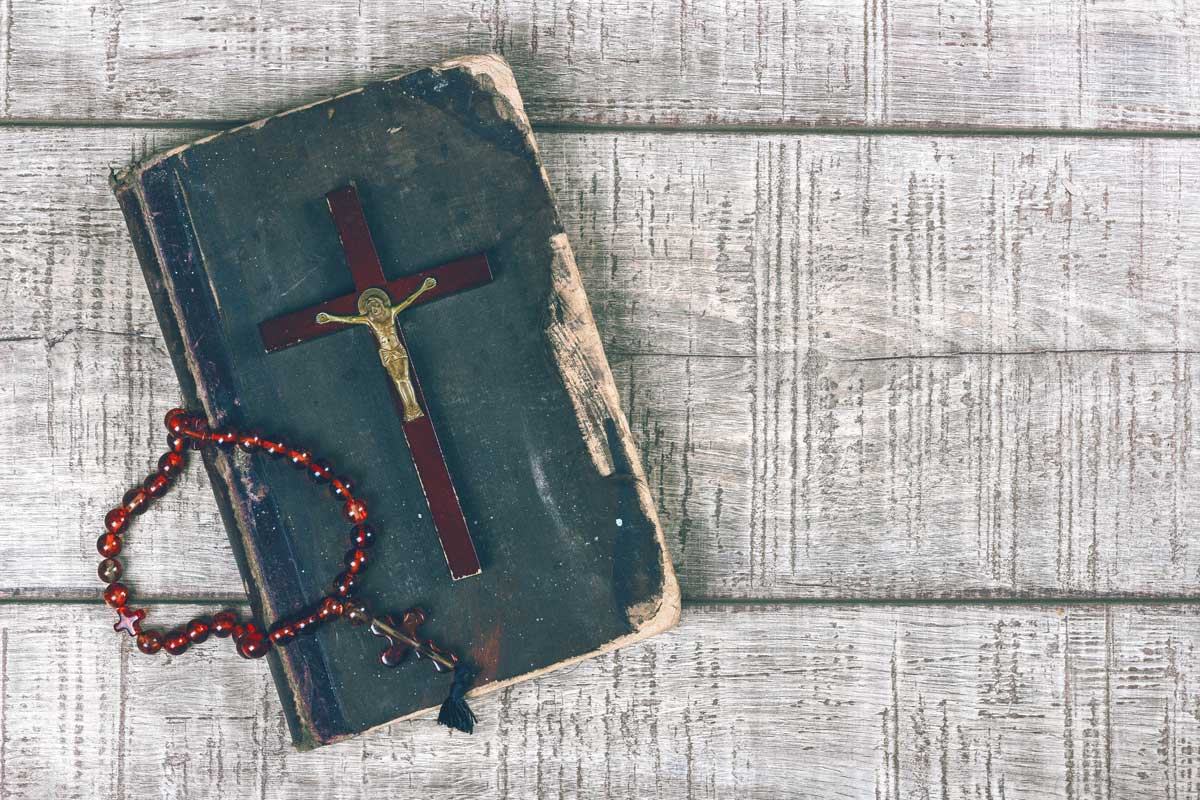
24.6—Nov/Dec 2011
Liberty, Conscience & Autonomy
How the Culture War of the Roaring Twenties Set the Stage for Today’s Catholic & Evangelical Alliance by Barry Hankins
more from the online archives
calling all readers
Please Donate
"There are magazines worth reading but few worth saving . . . Touchstone is just such a magazine."
—Alice von Hildebrand
"Here we do not concede one square millimeter of territory to falsehood, folly, contemporary sentimentality, or fashion. We speak the truth, and let God be our judge. . . . Touchstone is the one committedly Christian conservative journal."
—Anthony Esolen, Touchstone senior editor





